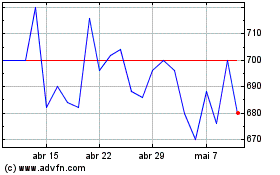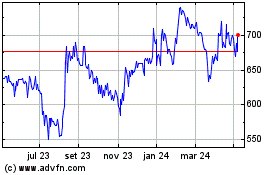U.S. index futures rose in Friday’s pre-market, fueled by
anticipation of key earnings reports from Chevron and Exxon Mobil,
as investors awaited the crucial jobs report and the conclusion of
the most intense week of S&P 500 earnings season.
At 6:08 AM, Dow Jones futures (DOWI:DJI) rose 108 points, or
0.26%. S&P 500 futures gained 0.34%, and Nasdaq-100 futures
advanced 0.41%. The 10-year Treasury yield stood at 4.297%.
In commodities, West Texas Intermediate crude for December rose
2.70% to $71.13 per barrel, while January Brent rose 2.51% to
$74.64 per barrel.
Oil prices surged on reports of a potential Iranian attack on
Israel from Iraq. Markets responded to signs of possible
hostilities, with Israel pledging a strong response to any new
attacks. Middle East tensions and potential OPEC+ production delay
kept the market heated despite forecasted weekly losses.
Gold (PM:XAUUSD) rebounded after a sharp drop, rising 0.16% to
$2,750.79 per ounce.
Palm oil climbed to a two-year high, driven by strong demand and
limited supply. Malaysian exports rose 11% in October, and biofuel
demand is growing. Indonesia plans to increase palm oil usage in
biodiesel blending, sustaining the rise through 2025.
Today’s U.S. economic agenda includes the October jobs report at
8:30 AM, with 110,000 job creations expected, down from 254,000
previously. Unemployment is forecasted to remain at 4.1%, and
hourly wages are projected to rise 0.3%, with an annual rate of
4.0%.
At 9:45 AM, October’s final manufacturing PMI will be released,
with a previous reading of 47.8%. At 10:00 AM, September
construction spending is expected to hold steady, and October’s ISM
manufacturing index should edge up to 47.6%. October’s auto sales
will be announced throughout the day, after reaching 15.8 million
last month.
Asia-Pacific markets closed mixed. China’s CSI 300 dipped
slightly to 3,890.02 after intraday gains. Hong Kong’s Hang Seng
rose 0.93%, while Japan’s Nikkei and Topix fell 2.63% and 1.52%,
respectively. South Korea’s Kospi dropped 0.54%, and Australia’s
ASX 200 declined 0.5%.
Asian industrial activity stalled in October, with China’s
recovery offering limited boost to the region. Japan’s industrial
PMI fell from 49.7 in September to 49.2, reflecting weak demand.
South Korea’s PMI held at 48.3, indicating contraction for a second
consecutive month. Nevertheless, China’s PMI rose to 50.3,
signaling expansion after economic stimulus.
China’s new home prices accelerated in October, indicating an
early impact from recent stimulus in the crisis-hit real estate
sector. Across 100 cities, average prices rose 0.29%, compared to
0.14% last month, with large cities like Shanghai showing the
largest increases. Year-over-year, the average price increased by
2.08%, compared to 1.85% growth in September.
South Korea’s exports grew 4.6% in October, marking the smallest
gain in seven months at $57.52 billion, below Reuters’ forecast of
6.9%. Weak global demand and U.S. electoral uncertainty affected
trade, while daily exports dropped for the first time since
September 2023.
Australia’s producer price index rose 3.9% in Q3 year-over-year,
slowing from 4.8% last quarter. Quarter-on-quarter, it grew 0.9%,
slightly below the previous 1% rise, according to the Australian
Bureau of Statistics.
A record 5.1% increase in Japan’s minimum wage is expected by
March 2025, benefiting low-wage regions. The Bank of Japan reports
that the wage hike will boost inflation, particularly in services,
bringing it closer to the 2% target. Inflation, currently at 2.4%,
reflects more labor cost increases than raw materials.
European markets traded higher, with investor optimism ahead of
the U.S. jobs report, with oil and gas stocks leading gains.
Shares of Reckitt Benckiser Group Plc (LSE:RKT)
surged 9% after a U.S. jury acquitted the company and
Abbott Laboratories (NYSE:ABT) of allegations
related to hidden risks in formulas for premature infants. This
unexpected victory lifted shares up to 10.9%, alleviating concerns
of potential liabilities of up to $1 billion for Abbott.
Boohoo Group (LSE:BOO) appointed former
Debenhams CEO Dan Finley as its new CEO, replacing John Lyttle and
thwarting billionaire Mike Ashley, founder of Frasers
Group (LSE:FRAS), who had sought control.
Shares of Secure Trust Bank (LSE:STB) dropped
13.4% after the bank announced that pre-tax profits would fall
short due to issues in its vehicle finance sector. A disruption in
collections, triggered by a review by the UK Financial Conduct
Authority, affected the recovery of defaulted balances, which is
expected to extend into 2025.
Shares of Aker Horizons (AQEU:AKHO) fell 2.5%
after reporting third-quarter losses of €134 million, impacted by
assets in Chile and non-essential investments.
U.S. stocks fell Thursday, with the Nasdaq dropping 2.8%,
reflecting a tech sell-off after Microsoft’s
(NASDAQ:MSFT) disappointing revenue forecast and a 4.1% drop in
Meta (NASDAQ:META). The PCE price index rose 0.2%
in September, with core PCE growth, excluding food and energy,
steady at 2.7% year-over-year, intensifying concerns about a
gradual slowdown in rate cuts.
Upcoming quarterly reports include
FuboTV (NYSE:FUBO), Chevron (NYSE:CVX), ExxonMobil (NYSE:XOM), Wayfair (NYSE:W), Dominion
Energy (NYSE:D), Charter
Communications (NASDAQ:CHTR), Oxford
Lane
Capital (NASDAQ:OXLC), LyondellBasell (NYSE:LYB), Air
Canada (USOTC:ACDVF) and Butterfly
Network (NYSE:BFLY) before the open.
Secure Trust Bank (LSE:STB)
Gráfico Histórico do Ativo
De Nov 2024 até Dez 2024

Secure Trust Bank (LSE:STB)
Gráfico Histórico do Ativo
De Dez 2023 até Dez 2024
